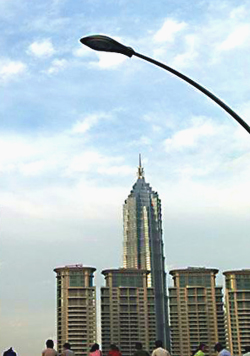'Minor property right' -- better than none?
Updated: 2007-07-11 18:24
In Beijing's heated real estate market, 300,000 yuan can buy no more than a 20-square-meter apartment within the second ring road. And, with a bit luck, you might be able to buy a 40-square-meter place inside the fifth ring with the same amount of money. However, you can afford a 100-square meter home in some residential complexes near the fifth ring but with a vague property right.
With an amazingly low price of about 3,000 yuan per sq. m., the apartment complex named Tai Yu Yuan on the outskirts of Beijing attracted quite a few potential home buyers from the city and even neighboring cities and provinces when sales of a new phase started in late May. This is the so-called "minor-property right" apartments.
|
|
An old woman surnamed Li who had bought a flat there last year at 2,500 yuan per sq. m. came to the agency's office to buy another for her son. " If you decide to buy one, there's no need to think too much," she said.
"I sold four flats just today," said a broker, saying that some of his clients were from Huhhot, Inner Mongolia Autonomous Region in North China.
The affordable price was so attractive that many of the property buyers, mostly young people and the elderly, overlooked the main crux of the problem.
In fact, what they bought is not the ownership of the apartments, but only the right to live in there.
Unlike typical property projects in China which are constructed on the land that is owned by the government, the land on which Tai Yu Yuan was built is owned collectively by the villagers' committee of the Zhangjiawan Village, Tongzhou District in the eastern suburb of Beijing. The committee is also the developer of this residential community.
This significant difference means these people are illegally buying property that should be for the villagers to live in, not others.
In China before a property development is built, the government reclaims the land and then sells it to developers. The China Economic Weekly found out that Tai Yu Yuan was built with the government's permission as a renovation project for local villagers, which forbids any public sale, but the villagers' committee changed the blueprints to add more complexes to sell to the public.
As developers of Tai Yu Yuan -- the committee and villagers involved - don't have to pay a hefty tax to governmental departments as other developers do, they benefited the most from selling the unauthorized apartments.
"Minor-property right" projects have bloomed in the last five years amid a nationwide price hike for homes. For buyers, the biggest selling point of these apartments is the surprisingly low price in a red hot property market in China, especially in Beijing and other large cities where housing prices can rise by double digits monthly. The strong demand for affordable property fuelled the illegal development of such projects, Hu Jinghui, deputy director of 5I5J property managing company told China Youth Daily.
Among the 400 residential developments currently on sale in the Beijing market, 18 percent are "minor-property right" projects of this kind.
In late June the country's Ministry of Construction warned that properties built on collectively owned lands are not under legal protection, saying the so-called "minor property right" is actually "no property right" to their owners, who will have difficulties and disputes in selling or getting heritage status to avoid demolition. But the agency didn't make it clear whether or how the property rights of these apartments will be resolved.
But the alarming signal seems ignored by the hot market, and still, many buyers believe "the law won't punish the mass of people," calling on the government to legalize their existing property right on their apartments.
|
|
|
||
|
||
|
|
|
|
